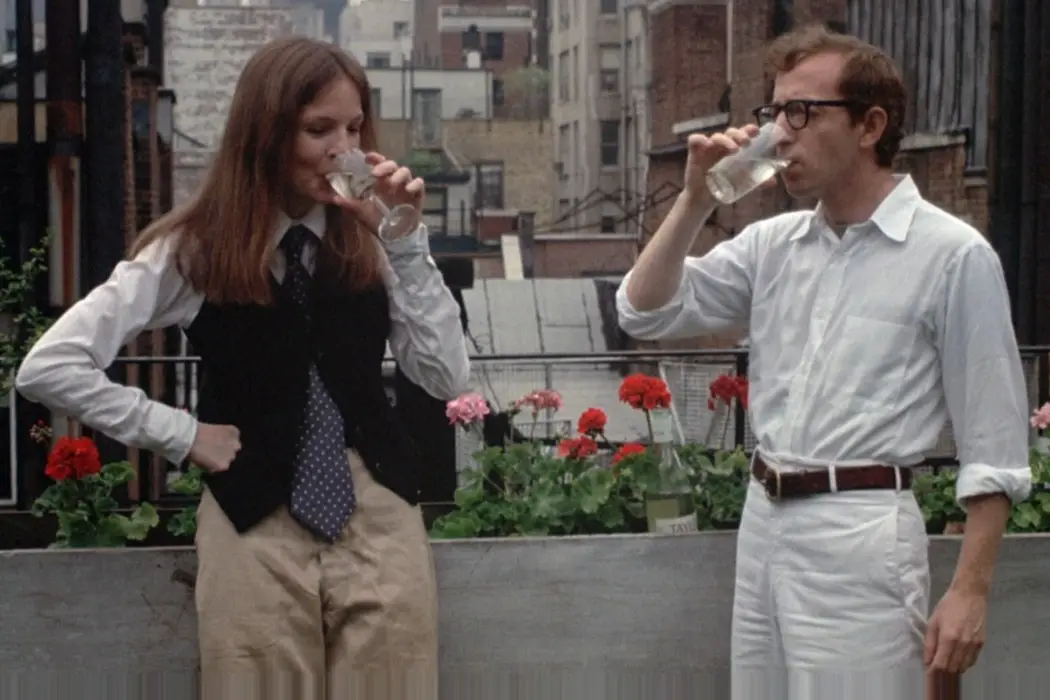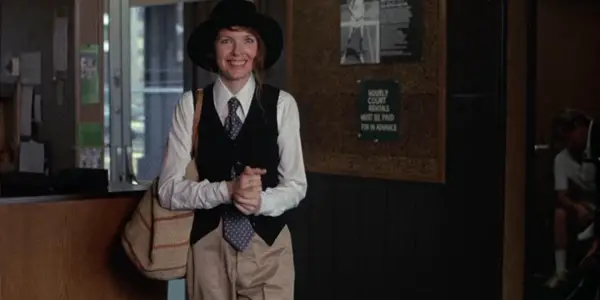Art Vs. Artist: What Do We Do When Our Heroes Fail Us?

Jax is a filmmaker and producer, and a film &…
How many times a day do you walk through your own hallway? Three or four? If you’re like me and work from home a lot, it’s significantly more. It’s an interesting place in someone’s home. We often reserve the walls there for those things we wish to show off to our guests as they traverse through – important memories or meaningful pieces of art. The hallway tells us a lot about ourselves, and that’s why I’ve been struggling with myself every time I walk through mine lately.
A Piece of My Adolescence
Alongside the family memories and wedding photos, I hung two movie posters that I’ve owned and cherished for years before I even moved into this house. The first is a somewhat rare German poster for Stanley Kubrick’s Dr. Strangelove Or: How I Learned to Stop Worrying and Love the Bomb. Next to it hangs the source of my inner strife – a French print for Woody Allen’s Annie Hall.

I first saw Annie Hall in my early teens and it became an instant favorite, and as I returned to it over the years it only grew in my estimation as I began going through my own trials and tribulations in dating. As a woman, I admired Diane Keaton’s performance as a woman who grows into self-confidence and owns her slightly dorky but truly unique personality. As someone with terminally awkward social anxiety, I forever related to Woody Allen’s neurotic and self-deprecating character. I went out of my way to watch the film at least once a year.
I was aware of the accusations against Allen from the early 90’s, but I never saw them as an issue, believing firmly in “innocent until proven guilty”. I counted myself not only among his fans but among the most fervent of his fans; you can find me gushing over his films in this earlier article for this very publication. I continue to believe in “innocent until proven guilty”, and to be very clear, Allen was never tried for any sexual abuse allegations, but what I’m finding it more and more difficult to do is continue to be a fan. You see, I also believe in common sense, and when the allegations re-surfaced I started to question my position as a defender. Vanity Fair delivered the final nail in the coffin with this article by Maureen Orth.
Again, to make this crystal clear, I don’t know if Woody Allen did anything wrong. The problem is, I can’t say with any certainty whatsoever that he didn’t either. My own personal feelings on the matter are that it doesn’t look good. And so Woody Allen joins the list of artists that I can not, or rather will not, support. But this begs the question of “what is support?” Can you separate the artist from the art?
A Decision Must Be Made
I’ve had many long conversations about this, and… I don’t know the answer. I know that I haven’t been able to bring myself to watch Annie Hall again, even though there have been a few times I have wanted to. Every time I look at the poster on my wall, I feel completely torn. On the one hand, I in no way want to support a potential sexual abuser. On the other hand, is me privately watching a DVD in my own home doing that? If I went out and purchased a copy of Annie Hall now, that would be one thing, but that financial transaction is long over and done with and was carried out in good faith.
Someone posed the following scenario to me: if we discovered that Michelangelo was a pedophile, would the Sistine Chapel be shut down and repainted? Put aside the fact that I’m incidentally bringing Allen to the level of Renaissance genius, and really consider the question. Michelangelo in no way benefits at this point in time from any current enjoyment of his art. Is his art synonymous with him? In this instance, I decided that no, it wasn’t. This decision was entirely based on the impossibility of an abuser from gaining anything personally as the result of me enjoying the art. But I still haven’t watched anything by Woody Allen (or anything starring Kevin Spacey for that matter, following this scathing interview on Vulture), even if no monies were changing hands.
I could sit here and make what I feel is a perfectly sound argument for either scenario.
The Arguments
Of course you shouldn’t watch those movies anymore. Even passive support still qualifies as support and we should stand with victims, not abusers. So you have to sacrifice a few of your favorite movies? That’s better than living with the trauma of abuse. If you don’t think that you could watch the film if you were one of the victims, then you shouldn’t watch it at all.
OR
You’ve owned these films for years and watching them now isn’t hurting anyone. Besides, these people weren’t the only ones to work on the films – do the co-stars and crew want to sacrifice these films or are they proud of their work? Is every Oscar given to a Weinstein-produced film null and void? We shouldn’t destroy the accomplishments of literally thousands because of the horrors committed by a mere few.

It is a unique and fascinating capacity of the human mind to hold two opposing beliefs, known as cognitive dissonance. We know that the moral high ground lies in dismissing these works outright, but when something is your favorite, that becomes much more difficult to let go of. Our emotions are tangled into it and it can be almost painful to let go. Movies allow us to live inside them and escape briefly. Giving up that escape is difficult. I’m not sure we can demonize someone for wishing to revisit their favorite escape again. It is different than lining up to buy a ticket.
And yet, I still cringe at the sight of my poster in the hall. What it’s come down to is a personal choice for each of us. What can we live with? I am still not sure.
Should we ban films associated with sex offenders or is art and artist separate? Give me your opinion in the comments!
Does content like this matter to you?
Become a Member and support film journalism. Unlock access to all of Film Inquiry`s great articles. Join a community of like-minded readers who are passionate about cinema - get access to our private members Network, give back to independent filmmakers, and more.
Jax is a filmmaker and producer, and a film & tv production lecturer at the University of Bradford and is also completing a PhD about Stan Brakhage at the University of East Anglia. In the remaining "spare time", Jax organises the Drunken Film Fest, binges bad TV, and dreams of getting “Bake Off good” with their baking.













